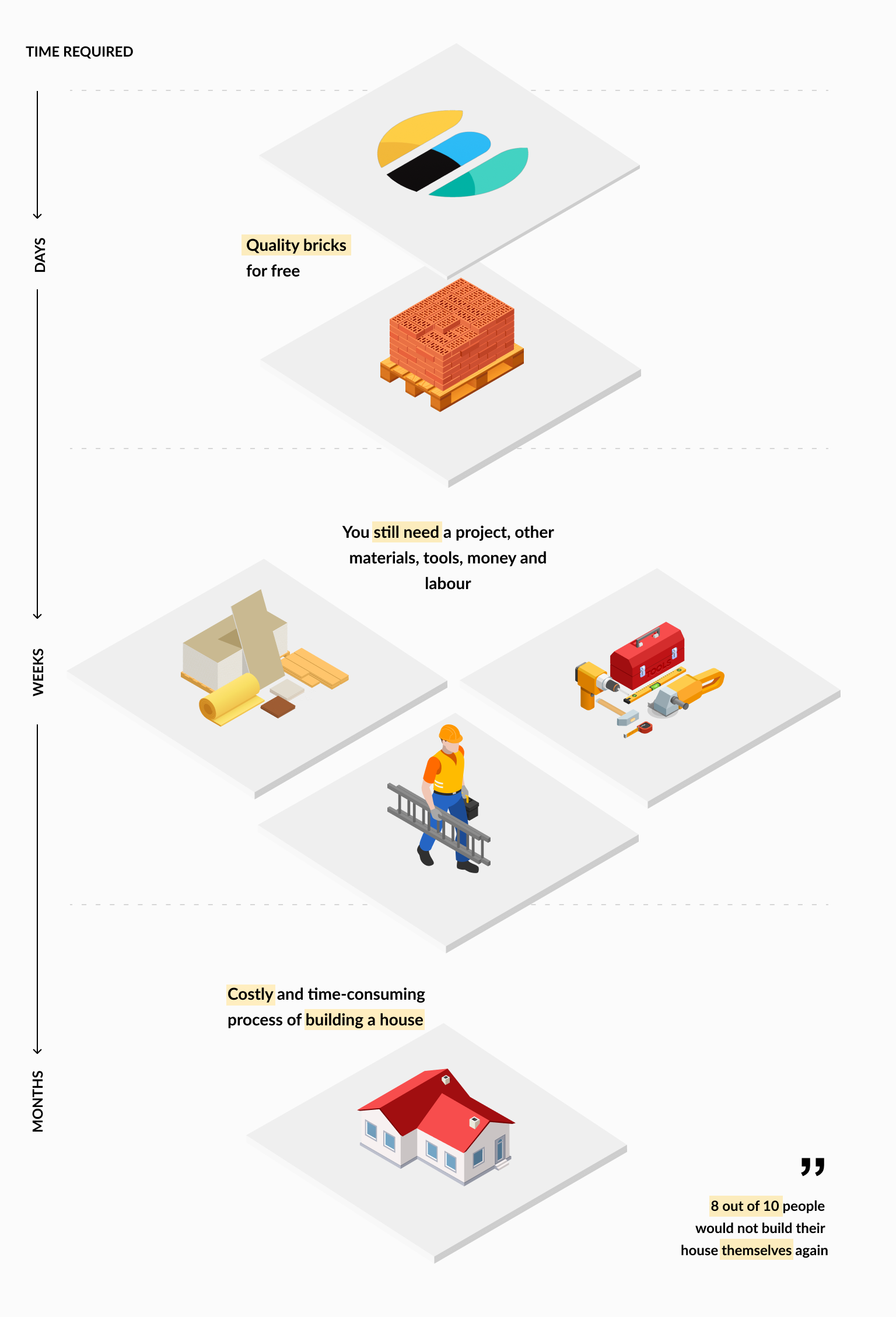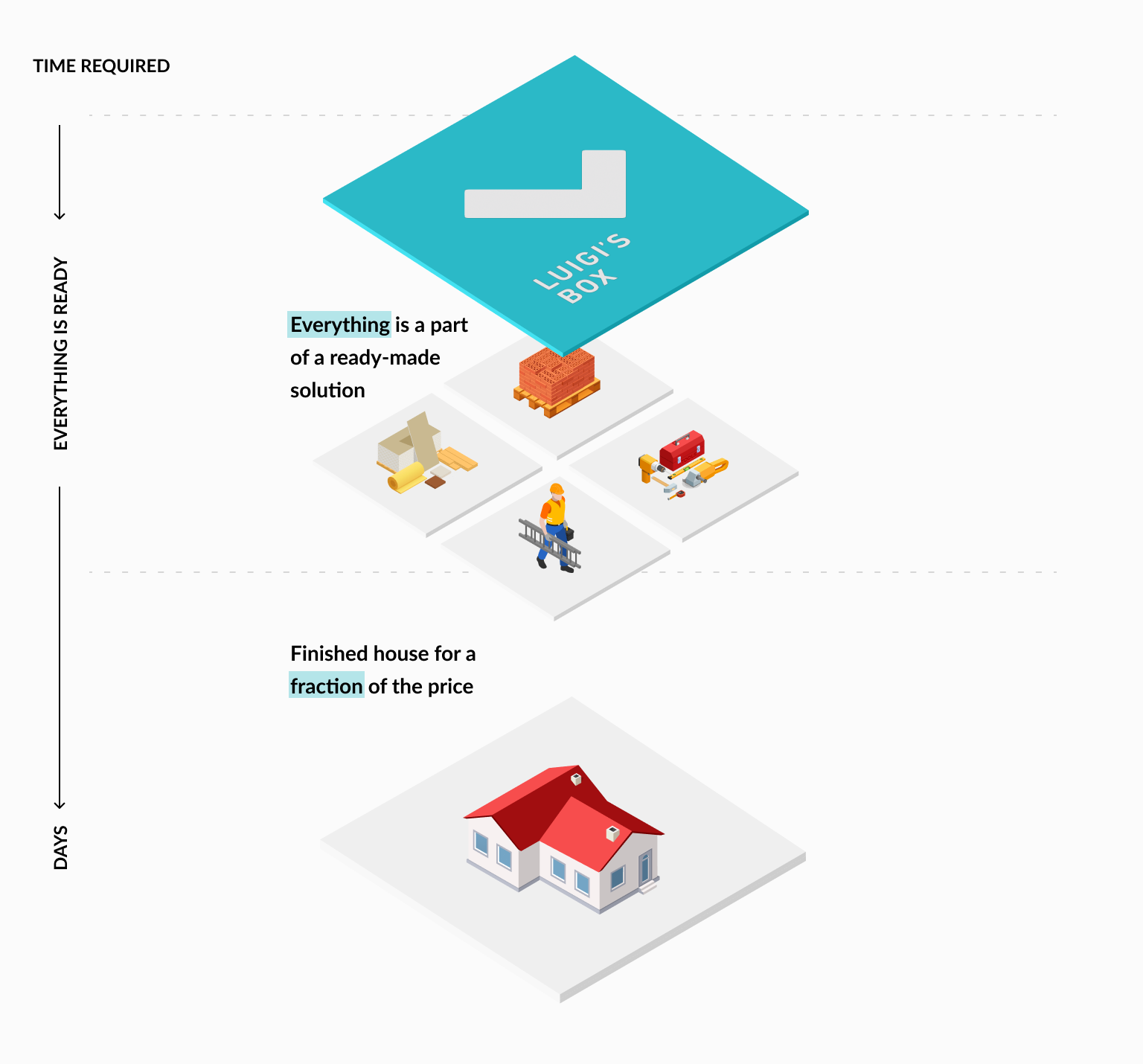If you buy quality bricks, it doesn’t automatically mean you’ll build a great house. If you install the latest Magento, it doesn’t automatically mean you’ll create a great e-shop. If you deploy Elasticsearch on your e-shop, it doesn’t automatically mean you’ll have a great search.


Luigi’s Box vs. Elasticsearch is like a house vs. bricks
Elasticsearch is a backend technology (bricks), while Luigi’s Box is a ready-made solution (a house). You will make it yourself if you have the capacity, skills, and know-how to build the house. If not, you will call the engineers who will do it for you.
It works similarly with search. Elasticsearch is a splendid solution if you have the capacity, skills, and know-how to build it. If not, you might consider a service that will do it for you.
Learn from our mistakes
When installing Luigi’s Box, a client buys more than just a product. Luigi’s Box has an extensive background in research and development. It started as research at a university, and today it is a world-class technology.
Our team has engineers, designers, idea holders, experienced programmers, and precise analysts who are all masters in their fields. We have developed, tested, optimized, and improved a lot. The result is a ready-made product.
However, it is not entirely done yet – we are constantly optimizing it with a clear vision of where to continue in the future. Thus, the client buys a product that improves over time.
A systematic approach is essential
It can quickly happen that you will set up a search for one phrase flawlessly and ruin the other 15. The only option to keep things balanced is constant measurement and testing. Integration tests are commonplace today. However, we decided to go even further.
We have created an infrastructure that enables secure offline testing of product changes with no detrimental effect on e-shop sales.
We test each search update offline on a copy of our client’s data to ensure that the changes do not cause negative discrepancies in our search statistics.
Keeping an eye on the catalog
The correct data in the product catalog are substantial for the functionality of an e-shop’s search. Many of our clients think they provide us with structured data about their products.
However, the truth is that we still need to process the data further to optimize the search because the quality of input data in its raw form would not be sufficient. We automatically analyze all data and extract structured information.
Features that are not common
The most important point that sets Luigi’s Box apart from Elasticsearch has search features that change how the customer interacts with the products. Unfortunately, developing these features is far from trivial.
As a result, it is more convenient for customers to shop in the e-shop, and their satisfaction is reflected in higher sales. With Luigi’s Box, you gain an edge over Elastic by several advanced search features, the most important of which are the following nine:
1. Comprehensive ranking
For us, the primary value in determining search results is not the full-text score but the quality of the match. We can identify the quality of the match based on which parameters the match occurs and to what extent. The highest quality is, of course, a complete match in the product name. However, business metrics also affect the ranking. It depends on how customers interact with each product, so we also consider clicks, sales, seasonality, the number of products in stock, or the margin.
2. Product variants
We diversify search results. We understand the concept of product variants and show only the most suitable option for each product. If there is a backpack in 10 sizes in the product catalog of the e-shop, we will not overwhelm the search results with ten variants of the same backpack but better display several different types of backpacks.
3. Fixing typos
A critical feature of a good search is working with the search phrase, even if the customer has made a mistake. Reasonable searches can correct typos and yield relevant search results even with inaccurate entries. However, beware of some cases when correcting typos might be harmful. If someone is looking for an iPhone 13, you don’t want your search to show also the iPhone 11 in the results because the customer is interested in a specific newer model.
4. Eliminate no-result searches
No result searches account for 13% of all searches. There is almost a 30% risk that the customer will leave the e-shop immediately after an unsuccessful search. Therefore, we try to avoid no-result searches. If portable speakers are sold out in the electronics e-shop, we will not display keyboards but instead, show other types of speakers. Thanks to the NLP (natural language processing) modules, we can determine which part of the entered phrase is less critical and perform a more general search. This shows the customer the available speakers (without the word portable) that may still be relevant to them.
5. Dynamic filters
Elasticsearch provides faceted filtering. However, it does not address the fact that different filters may be relevant for other products. Filtering by gender is unsuitable for tents, and filtering by the number of people will not be suitable for thermo t-shirts. Our algorithms know which filters each product category needs, and customers are not overwhelmed by irrelevant filters.
6. Product codes
Product codes can be rather fun. Codes 145-187 v. 145 and 187 v. 145187 belong to the same product. Here, handling the typos will not help, and it is not trivial to manage them correctly. Luigi’s Box can identify the product code and prepare the e-shop for customers to enter it in various ways when searching – with a hyphen, space, slash, or all together. Thanks to that, product code formatting will not cause the no-result search nor cause incorrect products to appear among the results.
7. Distinguishing categories
The product name itself often says nothing about the product. For example, MacBook does not suggest that it is a computer or Remarkable will not tell you that it is a tablet. Some categories combine elements in their name (e.g., beer and wine). Therefore, if you are looking for beer, dry red wine will also appear among the results. However, the customer wanted beers. Luigi’s Box can “choose” what part of the category name is essential and exclude what does not belong in the results.
8. Searches not in English
Native support for non-English languages at Elastic is at a very modest level. According to our evaluations, it can be more harmful than helpful for the search. That’s why we use our plugins to solve language processing tasks, thanks to which Luigi’s Box works seamlessly in all European languages.
9. Scaling
Our search does not use your site’s servers and therefore does not slow it down. Before Black Friday, you will have one less problem.
Elasticsearch is a great option, but not for an e-shop
Elasticsearch is great. We know it because we’ve built Luigi’s Box on top of it. However, for a modern e-shop, Elastic is not enough.
Many features that e-shop searches use to help customers find products require hours and hours of coding, trying, testing, and optimization.
Luigi’s Box has been around for years and offers a comprehensive solution possible to integrate within four steps with no need for programming.
Not even the recent 8.0 update?
Elastic 8.0 update can solve natural language processing tasks with good support and detect anomalies or outliers. In addition, it fits into the branch where Elastic is used as a repository for infrastructure logs.
Most classification and regression use cases focus on unstructured text from which it’s possible to extract something but not to classify or search for answers to questions in natural language.
All in all, non-specialists can’t use it effectively for e-shops. You need a person who knows machine learning. Or a whole company (Luigi’s Box).








































